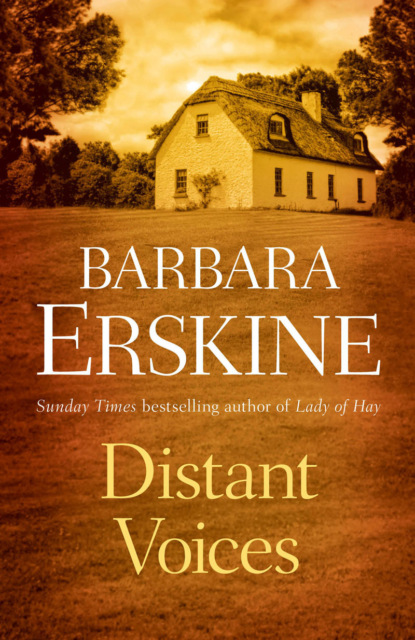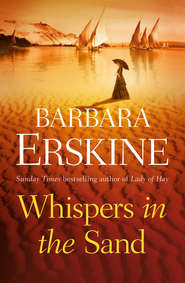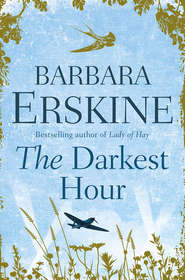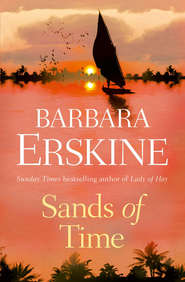По всем вопросам обращайтесь на: info@litportal.ru
(©) 2003-2024.
✖
Distant Voices
Автор
Год написания книги
2019
Настройки чтения
Размер шрифта
Высота строк
Поля
‘Well, I’m not going to sit up all night. Lock your door.’ Harriet was beginning to feel alarmingly tired. She had driven nearly two hundred miles that day and now, to find her room was next to that of a gunman – actual or potential – it would be surprising if she had not found the situation exhausting. She watched Cathie drag her case across the hall and disappear into her room, then with a sigh she closed her own door and locked it.
The rest of the evening was uneventful. She managed to reach the bathroom safely, then she regained her bedroom where she climbed into bed with a book and her little transistor radio to listen to the news. The news, when it came, was disappointingly lax in reporting any escapes from any prisons anywhere and she turned it off, half relieved, half disappointed, and opened her book. Hercule Poirot was hot on the trail; she began to gnaw her thumbnail avidly, her pages turning more and more quickly as the book neared its climax.
And then she heard it. In the silence of the room she could just make out the sound of a movement next door. She dropped her book on the counterpane and listened intently. Yes, there it was. A scraping and tapping. And then footsteps. A drawer being dragged open – quite distinct, that sound – and a low cough.
She pulled the bedclothes up to her chin and listened as hard as she could. The wind was blowing more strongly now. She could hear the hedgerows rustle and squeak, and the tapping, somewhere, of a twig against the window.
Suddenly she could not bear not to know what was happening. She slipped out of bed, turned off her side-light and tiptoed, shivering in the dark, to the window. She flung back the curtains and peered through. It was pitch black out there, save where the light from a neighbouring window, his window, streamed out across the pale grass.
She waited, hoping to see his shadow, but there was no sign of movement, only the methodical noises from next door. Then the light went out and there was silence. She held her breath.
Distantly she could hear the strange echoing, churring noise of a nightjar somewhere on the marshes. It was a very lonely sound above the endless sighing of the sea. She strained her ears again. There was no sound of bedsprings from next door. Had he gone to bed, or was he still up waiting, and listening, just as she was? Leaving the curtains open she turned towards her own old-fashioned iron-frame and climbed wearily in. She was still very tense and she found herself longing to be able to go and fetch some hot milk. That alas was not possible in someone else’s house, even had she plucked up the courage to leave her room again.
Eventually she dozed.
The dog awoke her, barking furiously somewhere the other side of the house. She lay rigidly clutching the bedclothes, her heart pounding uncomfortably as she gazed up at the ceiling. Then, cautiously, she moved her eyes. A large round moon had risen. The pale colourless light flooded through the window illuminating her door and the far wall. Her eyes went without volition to the door-handle. Had it moved? Her hands flew to her mouth as she stared fascinated, hardly daring to breathe.
Then she heard it again. A stealthy movement from next door. He was stirring. She raised herself cautiously on her elbow and groped for her little clock. Half past three. Footsteps trod softly across the floor in the next room and she heard a creak and then a low clatter. He was up. He was walking about.
She put the clock down and lay back on her pillow, tensely listening to every sound. A bar of cloud drifted over the face of the moon and for a moment her eyes closed.
He had picked up the gun and was standing carefully behind his door listening. The dog was silent now and nothing in the house seemed to be awake. He checked that the gun was loaded and then, shouldering his haversack, he opened the door softly and listened again.
The old woman was standing in the hall in a patch of moonlight, waiting for him. It was the blonde, nervous one; the younger of the two. She stood there in her pink flannel nightdress, her hands stretched out as if to bar his way.
Harriet had opened her door a fraction. She put her eye to the crack and with a gasp saw Cathie standing there blandly smiling in her nightdress, her bare feet white in the moonlight. What was she doing? Why didn’t she move? Was the silly woman sleepwalking?
She tried to call out as the man stood in his doorway, his face growing ugly with anger, but Cathie didn’t seem to see that she was antagonising him, and no sound came to Harriet’s dry lips. Her throat was constricted with fear.
Then it happened. The man strode forward. He tried to push Cathie out of his way but she stood firm, gazing at him gently, that irritating foolish smile still on her face. He pushed again and she began to struggle with him, the two figures circling slowly, soundlessly on the rag rug on the polished wood floor.
Then the gun went off. It wasn’t a loud bang. Just enough to make Harriet jump, her heart leaping, thudding, into her throat. Then she saw the blood. Cathie was still smiling, but there was blood soaking through her nightdress. Drops fell darkly onto the rug and the polished floor, wet, black pools in the silver moonlight.
Slowly Cathie’s hands went to the place and, surprised, she looked down, and still looking surprised, she sank slowly to her knees. Harriet wanted to scream. She wanted to call out. She wanted to run.
She stood rooted to the spot for a moment, and then, terrified as the man turned to look at her, his face a blank mask, she moved at last, retreating into her bedroom, slamming the door, leaning against it, sweat pouring down her face. The key. Where was the key? Surely there had been a key?
Her fingers fumbled desperately at the lock and at last she managed to turn it. She ran for the chair which stood before the small table and wedged it under the door-handle, then she ran to the window and drew the curtains tight to shut out the cruel moon.
‘Cathie!’ she sobbed out loud. ‘Cathie.’
She heard steps outside her door and she froze. He was listening at her keyhole. She turned to look but the room was pitch black without the moonlight. She dared not move to try and find the light-switch.
She waited for what seemed like hours, hardly daring to breathe, then at last, shaking uncontrollably, she groped her way to the bed and sat down. She dared not open the door to look. But supposing Cathie were still alive? Suppose she needed a doctor? She pictured again that swelling scarlet patch on the flannel nightdress, and miserably she closed her eyes. It had been right over Cathie’s heart.
She must have dozed. When she awoke it was daylight. She lay, puzzled for a moment at the intense misery which gripped her whole body, gazing out of the window at the blue sky, light with high puffy clouds. Then she remembered. She dragged herself from the bed and went to the door and listened. The house was silent. She swallowed hard, then, suddenly resolute, began to dress as quickly as she could. She was stiff and her fingers were awkward and cold but she was determined to face whatever had to be faced from the security of her tweed suit. She even ran a brush briefly through her curly white hair.
Then she was ready. She listened carefully as very cautiously she turned the key. It took a lot of courage to open the door but she did it at last and looked out.
The body had gone. The floor was clean. Everything was as it had been the night before when she first went to bed. She breathed a sigh of relief. Mrs Cosby must have found Cathie. Perhaps the ambulance had already taken her away.
Plucking up her courage she went softly down the passage towards the guests’ sitting room. A strong incongruous smell of bacon was floating up the passage. She shuddered as she pushed the door of the sitting room open. The same two tables were laid again, one for one, one for two. At the latter sat a figure.
‘Hello dear.’ Cathie peered round. ‘I knocked on your door earlier, but you must have been sound asleep.’
Harriet’s mouth fell open.
‘Are you all right, dear?’ Cathie looked concerned. ‘Come and have some cornflakes. This sea air has already made me hungry.’
Harriet groped her way to the table and sat down. Her eyes were fixed on Cathie’s bosom which was covered in a pale yellow jumper.
Cathie smiled at her benignly. ‘Have some coffee, dear. That nice Mr Danway will be in soon. I was asking Mrs Cosby about him. He’s here for the duck shooting, you know. He went out in the early hours this morning. I’m surprised you didn’t hear him.’ She leaned forward confidentially. ‘Do you know, Hattie. It was so ridiculous last night. I dreamed he broke into your room and shot you! It really quite upset me this morning till I realised it was just a dream.’ She gave a little giggle as Harriet slumped into her chair. ‘I suppose it was the gun that did it. Silly me. Shall we go down on the beach later and look for shells, dear?’ she went on happily. ‘It’s going to be a lovely day.’
With a shaking hand Harriet reached for her napkin, guiltily pushing away the whisper of treacherous disappointment which had touched her at the sight of Cathie’s robust form. ‘You must have eaten too many sausages last night,’ she murmured with something almost approaching her usual asperity. ‘Fancy dreaming a stupid dream like that!’
Frost (#ulink_3204fbe7-9a9a-5769-aeb5-b86f7d10c104)
The chain-link fence gleamed red in the light of the rising sun. Looking down at it from her bedroom window across the bare square of earth and rubble which would one day be their garden, Amanda sighed. Turning from the window she sat down on the end of the bed and stared round the room. Small, functional and new, like the garden. So new it still smelled of paint and varnish and the sour tang of sawn deal.
Next door the baby was crying again as it had been on and off all night. The muffled protests and the distant sound of a radio somewhere across the road only served to emphasise the silence in her own house.
‘We must live somewhere new; so new no one else has ever lived there before! I don’t want a second-hand house! I don’t want a house full of other people’s dreams and nightmares.’ Andrew’s sweep of argument carried all before it as it always had and her own dream of an old cottage with a thatched roof and roses round the door crumbled before his enthusiasm, swept away as impractical and romantic and hopeless.
So here they were, newly married, newly moved, practical and down-to-earth and Andrew had left for work, early as usual, leaving her with the long day stretching out before her, empty, soulless and alone.
‘You’ll soon find a job; make some friends. Go and knock on some doors.’ So easy for him. He had done it already and talked cars and sport and TV programmes and the relative qualities of the local pubs. Her knocks had been greeted with vague smiles, barely concealed impatience, screaming children, hurried uncomfortable exchanges in the frantic business of her neighbours’ days.
Standing up at last she went to the window again. The sun was up now, the light outdoors harsh and unforgiving. Beyond the chain-link lay all that remained of the old suburban garden in which their small development of ‘executive starter homes’ had been built. The grey stone mansion had long gone, destroyed, so she had heard, by fire, but something remained to titillate her curiosity for there, beyond the long swaying grasses and the lichen-covered apple trees, she could see the reflection of the sun on glass. Several times she had walked round the neighbouring streets, trying to find the entrance to the garden, but with no success. It seemed to be a lost enclave, an unsold, unremembered plot amongst the neat geometric streets, the small red roofs and the manicured lawns. The lost garden beckoned. It was old; it was romantic; it was the focus of her dreams. One day she knew she would find the entrance and walk there on the old land beneath the new.
She had no premonition that today would be the day, no warning that suddenly the urge would become undeniable. One minute she was standing in her lonely bedroom listening to the baby’s wails, the next she was running downstairs, knowing that she had to find what lay beyond the wire.
No one saw her. Glancing behind her at the rows of neat windows, most swathed modestly in ruched nets and fancy frills, she put her foot, without giving herself time to think, on the concrete stanchion which held the high fence in place, grabbed at the top of the wire and vaulted it. In the neat houses behind her, women got their children ready for school; they fed their babies and made their beds and looked for the car keys so they could go to a supermarket too far away to visit on foot. None looked out of the windows. There were no gardens yet to admire. Some had laid neat squares of grass bought by the metre; two had planted small whips of birch and miniature weeping willow. None looked beyond the chain-link fence. Those who did saw nothing but a wilderness of weeds and wondered, if they thought at all, why the plot had not been sold.
Amanda stood for a moment feeling the unexpected iciness of early morning dew soaking into the legs of her jeans. It made her gasp with surprise. Glancing back she saw how high the wire she had vaulted was from this side, with beyond it the blind windows, and she shivered. Ducking through the wet grasses she ran for the apple trees, suddenly afraid of being seen, feeling the catch of bramble and spear thistle, the slippery wetness in her shoes, the cling of burrs in her hair, then she was out of sight of the houses and wrapped in the silence of the garden.
She stopped, trying to steady her breath, willing the beating of her heart to quieten and steady, and at last, as the pounding in her ears subsided, she let the peace and beauty of the garden enfold her and soak into her soul. Walking slowly now, exploring, confident she could not be seen, she found that she was listening to the liquid song of a wren as it scuttled and hid in the ivy which swathed an old grey garden wall. On the top of one of the apple trees a blackbird eyed her suspiciously and then relaxed, ignoring her. Its throat swelled and it began to sing, the sound echoing gloriously round her in a cascade of liquid notes.
Enchanted, she listened without moving, conscious that in the distance she could hear the steady popping sound of ball on racquet from the municipal tennis courts in Celadon Road – surely once part of this same garden. She did not move until the blackbird stopped, flirted its tail and flew away. Then she plunged further into the undergrowth.
She saw the old man before he saw her. A trug laden with flowers on his arm, he moved slowly and silently away from her along the path and out of sight. Frightened and embarrassed she drew back into the shelter of the brambles and watched.
The half ruined, shabby greenhouse stood against a high brick wall. Most of the glass was broken; that which remained was smeared and furry with lichen. On the wooden battens the paint rose in blistered flakes to leave weathered broken frames for the surviving jagged triangles of glass which they clasped. This then had been the glass she had seen from her bedroom window; this the glass which had caught the rising sun. She crept closer, staring in. Where had he got the flowers? She could see the wild remains of an old vine, clinging to the glass; giant nettles, fat hen, avens. A few poppies splashed the only colour through the green; the staging was littered with broken clay pots and rotten splintered seed trays.
At the back door of the house he proffered the basket of blooms. ‘The last of the chrysanths, tell her ladyship.’
‘Her ladyship wants to see you.’ In a flurry of white aprons and uncomfortable self-importance the cook beckoned him in.
He nodded, stamping mud from his boots, pulling his cap from his head. For special occasions she often asked him in, planned the flowers with him, consulted his expertise. She loved flowers, did her ladyship. With a smile he stepped onto the shining oak boards and made his way towards the morning room.











